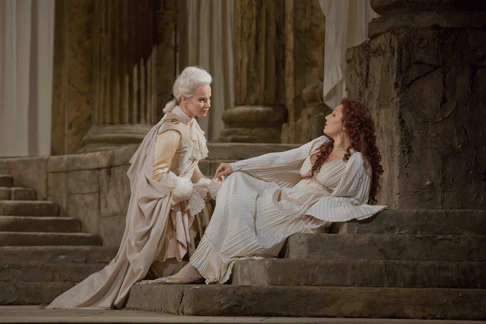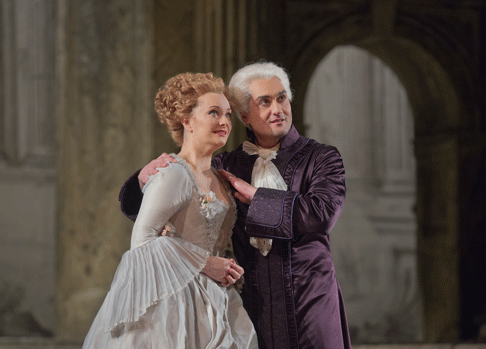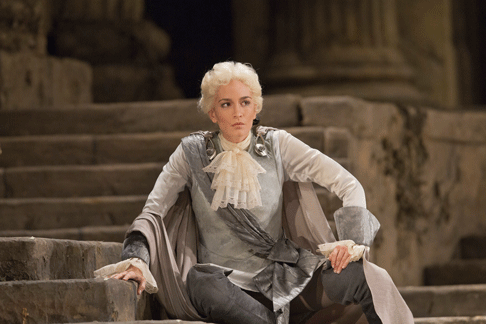10 Dec 2012
The Met’s La Clemenza di Tito blends inspired singing with dazzling wind obbligatos
The live HD simulcast of Mozart’s final operatic effort, set in ancient Rome, reached friends, Romans and countrymen the world over

The live HD simulcast of Mozart’s final operatic effort, set in ancient Rome, reached friends, Romans and countrymen the world over
The Roman Emperor Titus was by all accounts a forgiving man. At least when compared to the likes of Caligula, Nero and Commodus. But even Titus (or Tito, as he’s known in this opera) would have been hard-pressed to find anything in need of a pardon at the Met’s handsomely sung and visually appealing production of Mozart’s La Clemenza di Tito.
A splendid cast of singers, led by the brilliant Latvian mezzo-soprano Elīna Garanĉa, included strong supporting efforts by Kate Lindsey and Lucy Crowe — as well as some outstanding efforts from the orchestra pit. Put it all together, and the Met’s revival of Jean-Pierre Ponnelle’s 1984 production, set in ancient Rome, is worthy of, well, lending an ear.
Mozart began working on his final opera soon after beginning Die Zauberflöte, and completed it in 18 days — an astounding feat, even making all allowances for his subcontracting out of the continuo-accompanied recitatives.
La Clemenza di Tito was commissioned in 1791 to commemorate the coronation of Austrian Emperor Leopold II as King of Bavaria. Mozart obliged by reaching back in time to the crusty old Italian opera seria style championed by Pietro Metastasio — the early 18th century librettist whose plots extolled the magnanimity of enlightened kings and emperors.
Mozart settled on a revision of the Metastasio’s libretto by Venetian poet Caterino Mazzola that afforded him greater flexibility in structuring the arias.
The plot focuses principally on first-century Roman Emperor Titus (Giuseppe Filianoti) and Vitellia (Barbara Frittoli), the self-centered and manipulative daughter of the former emperor usurped by Titus. Jealous of the emperor’s affections toward other women, Vitellia convinces her love-struck suitor Sesto (Elīna Garanĉa) to assassinate him, and Sesto obliges by settings the royal palace on fire in an unsuccessful attempt on the emperor’s life. Unaware of the conspiracy, Titus agrees to marry Vitellia — who realizes her good fortune will come at the expense of Sesto, now imprisoned for treason and prepared to face execution rather than implicate her. In the magnificent aria “Non più di fiori,” Vitellia wrestles with her conscience and ultimately admits complicity in the plot, hoping to save Sesto. Titus, displaying royal compassion endemic to all Metastasio protagonists, decides to forgive all. Long live the emperor. Long live Leopold II. (Applause.)
 Elīna Garanča as Sesto and Barbara Frittoli as Vitellia
Elīna Garanča as Sesto and Barbara Frittoli as Vitellia
Garanĉa, whom Met audiences no doubt remember as the title character in both Carmen and La Cenerentola, was in outstanding form in the “trousers role” of Emperor Titus’s confidante (and would-be assassin), Sesto. Here, she crafted a dramatically three-dimensional character torn between his genuine friendship for the emperor and his dysfunctional infatuation with the vengeful Vitellia.
Her signature aria “Parto, parto” revealed an agile vocal quality sufficiently nimble to weave up and down the scale in rapid triplets figures that were handsomely in-sync with the accomplished clarinet obbligato provided by Anthony McGill.
It was nevertheless Garanĉa’s lengthy second-act aria, “Deh per questo istante,” which proved the showstopper. This emotionally charged aria ranks among Mozart’s very best, and its relaxed and leisurely tempo left ample room for Garanĉa to lay bare her character’s soul, which she did to powerful effect.
When I last saw Barbara Frittoli as Micaëla in the Met’s 2010-2011 season production of Carmen I praised the Italian soprano’s formidable vocal skills, but added that her acting abilities left much to be desired. Judging from Saturday’s performance, little has changed. Void of any appreciable degree of meaningful facial expressions (and one cannot hide from the close-up camera work), Frittoli remained emotionally aloof from the complex character she portrayed.
Vitellia must undergo a complete about-face in this story — from a raging femme fatale to a contrite, conscious-stricken human being prepared to sacrifice everything in order to spare the love-struck but well-intentioned sucker she had duped into murder. It didn’t happen. Frittoli’s “Non più di fiori,” the lengthy aria where this transformation must take place, was well sung but dramatically and emotionally vacuous.
In the pants role of the young patrician, Annio, mezzo-soprano Kate Lindsey sang beautifully and her acting throughout the production was beyond reproach. The lustrous quality of Lindsey’s voice was evident in her every solo and ensemble number, but it was the degree of expression and nuance that left an indelible mark on the listener’s psyche. I especially enjoyed the profound intensity of Lindsey’s second act aria “Tu fosti tradito,” sung as her character mounts a stirring appeal to the emperor for mercy.
 Lucy Crowe as Servilia and Giuseppe Filianoti as Tito
Lucy Crowe as Servilia and Giuseppe Filianoti as Tito
It appears that Lindsey has carved a niche in “trouser roles” at the Met. In addition to Annio she has played Nicklausse (Les Contes d’Hoffmann) and Cherubino (Le Nozze di Figaro). But with or without pants, it’s clear that Lindsey is a first-rate singer-actress, with an ability to climb into any costume and fill every limb with body and substance.
In her Met production debut as Sesto’s sister, Servilia, English lyric soprano Lucy Crowe delivered “S’altro che lagrime” with such warmth and purity of tone I felt cheated that Mozart only allowed her character this single aria. The delicate quality to Crowe’s voice seems especially well suited to lieder, although it was clear from her delivery that she is capable of packing considerable power when needed. I eagerly await Crowe’s next role at the Met.
As the benevolent Emperor Tito, an impeccably attired Giuseppe Filianoti looked and acted well enough to qualify as the noblest Roman of them all. His pleasant sounding voice nevertheless appeared weak and shaky throughout much of the first act, beginning with the aria “Del più sublime soglio” — where the Italian lyric tenor’s middle register sounded raspy and his legato uneven.
Filianoti, who has battled the effects of a paralyzed vocal cord following the removal in 2007 of a cancerous thyroid gland, came alive in Act 2 with a much sturdier voice. He finished strongly in the second act “Se all’impero,” in spite of some difficulty keeping up with the orchestra during the 16th-note coloratura runs.
Ponnelle’s spacious period set, revealing a partially decaying interior of a huge palace in ancient Rome adorned with an array of imposing Corinthian columns, looked handsome from most every angle of Barbara Willis Sweete’s kaleidoscopic camerawork. Curiously, Ponnelle’s costumes appeared rooted in the 18th century — an anachronism suggesting perhaps that the director was trying to forge an artistic connection between “classical architecture” and “musical classicism.” Either that, or the Met costume department was running low on togas.
 Kate Lindsey as Annino
Kate Lindsey as Annino
English conductor and early music specialist Harry Bicket directed an alert Met Opera Orchestra that played with alacrity, even during the routine recitativo accompagnato sections. In addition to Anthony McGill’s flashy clarinet obbligato accompaniment in “Parto, parto,” James Ognibene deserves kudos for his dazzling basset horn obbligato in “Non più di fiori.” Ognibene’s liquid tone throughout the range of this tenor clarinet sounded as warm and focused as that of an A or B-flat soprano clarinet. (Both obbligato parts were tailored for Mozart’s close friend and fellow Freemason, Anton Stadler.)
It’s understandable why Clemenza fails to muster the universal level of interest enjoyed by the composer’s more popular Italian operas Le Nozze di Figaro, Cosi fan tutte and Don Giovanni: It simply is not as good. On the other hand, there’s much to love and admire about Mozart’s final opera, including signature arias such as “Deh per questo istante.” Perhaps the current Ponnelle production will reignite listener passion for this deserving work.
If not, we may be needing yet another pardon from Titus.
By David Abrams